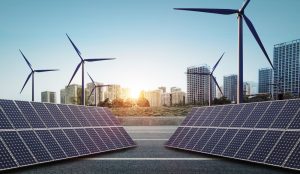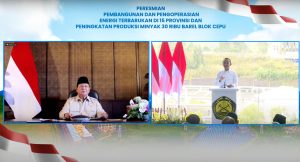Jakarta – Chief of Indonesia’s electric vehicle (EV) producers’ association believes that the country should seize the momentum of demand for environmentally friendly products.
Indonesian Electric Vehicle Industry Association (Periklindo) Chairman Moeldoko said that he believes the price of electric vehicles will significantly drop as production increases. He said “in the future, electric vehicles can be produced by medium and small enterprises. I’m sure because making the vehicles is so easy and simple.”
Moeldoko told participants of the 2023 Periklindo Electric Vehicle Show (PEVS 2023) electric vehicle exhibition in Jakarta that Indonesia has “the confidence to use the momentum of this changing situation to leap together while we talk about EV. This is the momentum, if we don’t welcome it well we will be left behind. If we jump instead of just walking, we will lead.”
He said Indonesia enjoys the development of electric vehicles. “We use a big portion of the state budget to subsidise oil fuel. If we massively shift to EVs, then the development of other sectors will benefit. State budget that was previously used for fuel can be used for other sectors such as health, education, and so on.”
Moeldoko, also the Chief of Staff of the President’s Office, said Indonesia has resources that can support the sustainability of electric vehicle production. Not only exhibiting electric vehicles, the exhibition also presents electric vehicle supporting industries such as charging technology, charging infrastructure, battery solutions, and other components.

Regional strength
At the event, Periklindo announced that it is joining forces with its regional counterparts. The Asian Federation of Electric Vehicle Associations (AFEVA) welcomes Indonesia as its newest member. Indonesian Electric Vehicle Industry Association (Periklindo) will join existing members from the Philippines, Singapore, Thailand and Malaysia.
Moeldoko said “the five members of ASEAN agreed to further lead the research and development of batteries. This is a good opportunity.” He said that by working together in the federation, respective countries will be able to influence national policies to support the development of a supportive ecosystem for electric vehicles.
R. Hendro Martono, Director of Maritime Industry, Transportation Equipment and Defence Equipment, Ministry of Industry said that as the largest economy in the region, Indonesias’ four-wheeled vehicle ownership at 99 units per thousand population is relatively lower than neighbouring Singapore at 211 units, Thailand at 275 units and Malaysia at 490 units per thousand population.
Martono said that in Indonesia there currently are 62,676 units of electric vehicles ranging from motorcycles, passenger cars, three-wheeled vehicles, buses and freight cars. He said that in 2030 the production of electric vehicles with a minimum domestic component level (TKDN) of 80% is targeted at 600,000 units of electric cars and as many as nine million units of motorbikes.
Racing to lead at what cost?
Earlier this year, Indonesia announced granting hefty subsidies for new purchases of EVs to boost sales. Martono said that the incentive given to electric motorcycles with more than 40% domestic component is IDR 7 million (USD 470) for 200 thousand units or a total budget allocated at IDR 1.4 trillion. (USD 94 million).
The policy is stated in Regulation of Minister of Finance Number 38 of 2023 on Value Added Tax on Handover of Certain Four-Wheel Battery Electric Vehicles and Certain Bus Battery Electric Vehicles Afforded by the Government Fiscal Year 2023.
Subsidies for battery-based four-wheel electric vehicles (KBLBB) and buses using 40 percent or more domestic components (TKDN ≥ 40%), is given in the form of ten percent waiver from the normally 11% of value added tax (VAT). EVs with less than 40% domestic components and assembled in Indonesia will receive a five percent VAT waiver.
The policy received wide criticism from civil society groups and analysts, mainly saying that the push for more EVs will not add up to GHG emission reduction since most of the electricity produced in the region is still powered by fossil fuel. Institute for Essential Services Reform (IESR) Executive Director Fabby Tumiwa said that “more than half of the electricity in ASEAN comes from coal-fired power plants. Meanwhile, to achieve the Paris Agreement target, all coal-fired power plants must be retired by 2040”.
Moeldoko said the subsidies were given because this sector is moving slowly. He addressed the criticism by saying that subsidies and incentives are currently being evaluated.
Green investment needed
Tumiwa said, more than 50% of the operating power plants in the Southeast Asian region are less than 10 years old with the consequence that the early retirement of power plants requires considerable financial resources, so it is necessary to combine with financing for the construction of renewable energy plants to ensure security of energy supply in a region whose economy is growing rapidly.
Martono cited that total investment in the EV assembly industry is IDR 3.233 trillion (USD 217 million) and 62.676 units are currently on the road, more than 75% are two-wheelers.
IESR’s analysis shows that over the last five years, the region’s average investment in renewable energy has only reached USD 1.6 billion per year, or 20 percent of the total investment needed to achieve the 23% renewable energy mix target in 2025. (nsh)














